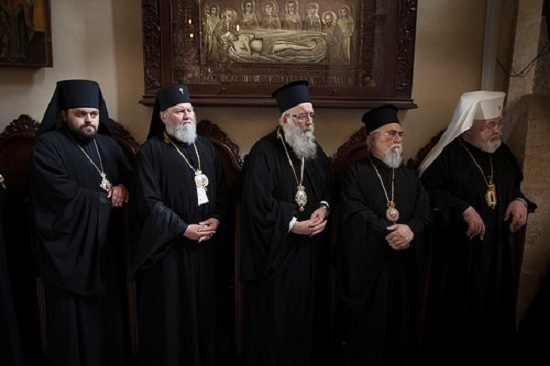Meletis Meletiadis, President of the Synod of the Greek Evangelical Churches, analyses the Orthodox Council in Crete (Greece).
 Liturgy at the Patriarchal and Stavropegial Monastery of Gonia. Following the Divine Liturgy the Primates of the Local Orthodox Churches and their delegations participated in the opening of the Holy and Great Council. / SEAN HAWKEY.
Liturgy at the Patriarchal and Stavropegial Monastery of Gonia. Following the Divine Liturgy the Primates of the Local Orthodox Churches and their delegations participated in the opening of the Holy and Great Council. / SEAN HAWKEY.
How do evangelical Christians see the Orthodox meeting happening in Crete? Meletis Meletiadis, President of the Synod of the Greek Evangelical Churches, told Evangelical Focus his perspective as an observer in Greece.
“The [Orthdox] Church needs to think over the new realities of the world and the ethical issues posed by them and come up with an answer. The Synod will also try to answer the Orthodox Church's presence and witness in the New World, as well as its relation with the other Christian Churches”, Meletis believes.
The meeting “is very important for the Orthodox Church, which claims unity in faith, to come out of this Synod united.”
DIVISIONS BETWEEN CHURCHES
Why have the Russian Orthodoxes and others not joined the meeting? “Officially they claim that the Synod is ill prepared and should have been postponed until all organizational problems were solved. However, unofficially, there is a power struggle between the Ecumenical Patriarchate and the Patriarchate of Moscow. The Churches of Bulgaria and Georgia are Moscow satellites.”
CONCERNS: SECULARISATION AND TECHONOLY
“Already in the first document which has already been signed, they speak about the secularization of the society, the technological advances and the ethical questions raised, the rise of religious fundamentalism, the presence of Islam in the Western World and the Church's response, etc.”
These are “very important documents by which the Orthodox Church is going to abide in the coming years. They hope that even those hierarchs of the various national Churches who did not show up, in the end they would also sign these important documents for the Orthodox Church and its witness.”
ETHNICITY SPLITS ORTHODOXES
Are the differences among Orthodox Churches in the world theological? “There are not any major theological and organizational differences”, Meletiadis argues.
“What divides them is not theology, but nationality and that's were the problem with Moscow resides. The matter of ethnicity is the 'Achillian heel' of the Orthodox Church.”
THE APPROACH TO PROTESTANTISM
The Orthodox Churches are “closer with the Roman Catholic Church as they share many commonalities. However, there is a deep divide, since 1054, which was exasperated by the 4th Crusade and the activity of the Unite Church in Orthodox lands (Orthodox in appearance and practice but recognizes the Pope as its leader). Since the '50 the two Churches have been in dialogue.”
“With the Protestants the situation is different. There are many matters that divide the two traditions. Yet, the Orthodox Church has been in dialogue with the Anglican, Lutheran and Reformed traditions”, Meletiadis concludes.
Learn more about the Orthodox Council by reading an interview with Orthodox Francisco José Pino and an article analysing the political and historical context of the meeting.

Las opiniones vertidas por nuestros colaboradores se realizan a nivel personal, pudiendo coincidir o no con la postura de la dirección de Protestante Digital.
Si quieres comentar o